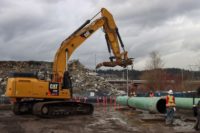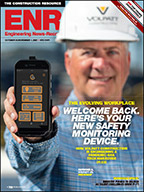Scanning technology can increase safety and productivity, but worker tracking systems still raise hackles over privacy issues on the job.
Many workers are used to checking into the proximity entry system of a New York City high-rise building, says Leo Labbate, general foreman at Hunter Roberts Construction. "I'm sure there is whispering here and there [about the system], but the brunt of it is over," he says.
Not everyone agrees. "I consider it to be invasive," says a marine mechanic at a government installation who asked not to be named for fear of retaliation. "Lines between work and private life are blurred more every day by technology." The mechanic says RFID badges monitor his coffee, bathroom and smoke breaks. "If I didn't have to take it home with me, if it was in a hardhat, that's a different story," the mechanic adds.
Hunter Roberts' proximity system only clocks workers into a site. After that, they can't be monitored. Jason Burns, vice president of technology at Hunter Roberts, says the benefits of the system far outweigh any negative aspects. Labbate says it increases the level of safety by both regulating entry and making sure no worker is left behind at the end of the work day.
Nicholas Chirello, shop steward on Labbate's site, says he doesn't feel his rights are being infringed upon because the system "doesn't monitor every step you take, just that you have entered the site."
Years ago, Labbate witnessed the dangers of not knowing the location of all employees. When a worker got left behind over the weekend, he died of a heart attack. "This system will prevent that from happening," Labbate says.
Workers at a test site who had RFID tags on their hardhats and vests were "surprisingly open to the technology," says Jochen Teizer, associate professor at Georgia Tech's School of Civil and Environmental Engineering. The idea of "Big Brother watching" concerned some workers, Teizer says. Many agreed with Chirello, who notes, "Even if you know my location, you still don't know what I'm doing."
However, privacy could become an issue if workers are tracked in areas such as break rooms or restrooms, Teizer adds.
"Federal law and unions are against that because it prevents workers from assembling to discuss personal matters," Teizer says. However, even if workers are tracked in real time on the jobsite, some zones can be excluded for privacy's sake.
Hunter Roberts' system provides daily construction reports, including staff counts, and tracks the involvement of the firm's minority- and women-owned subcontractors. Burns says it takes a significant amount of manual work off supervisors so they can pay attention to construction, rather than accounting for staff.











Post a comment to this article
Report Abusive Comment